King Charles says Canada faces a ‘critical moment’ in historic Throne Speech
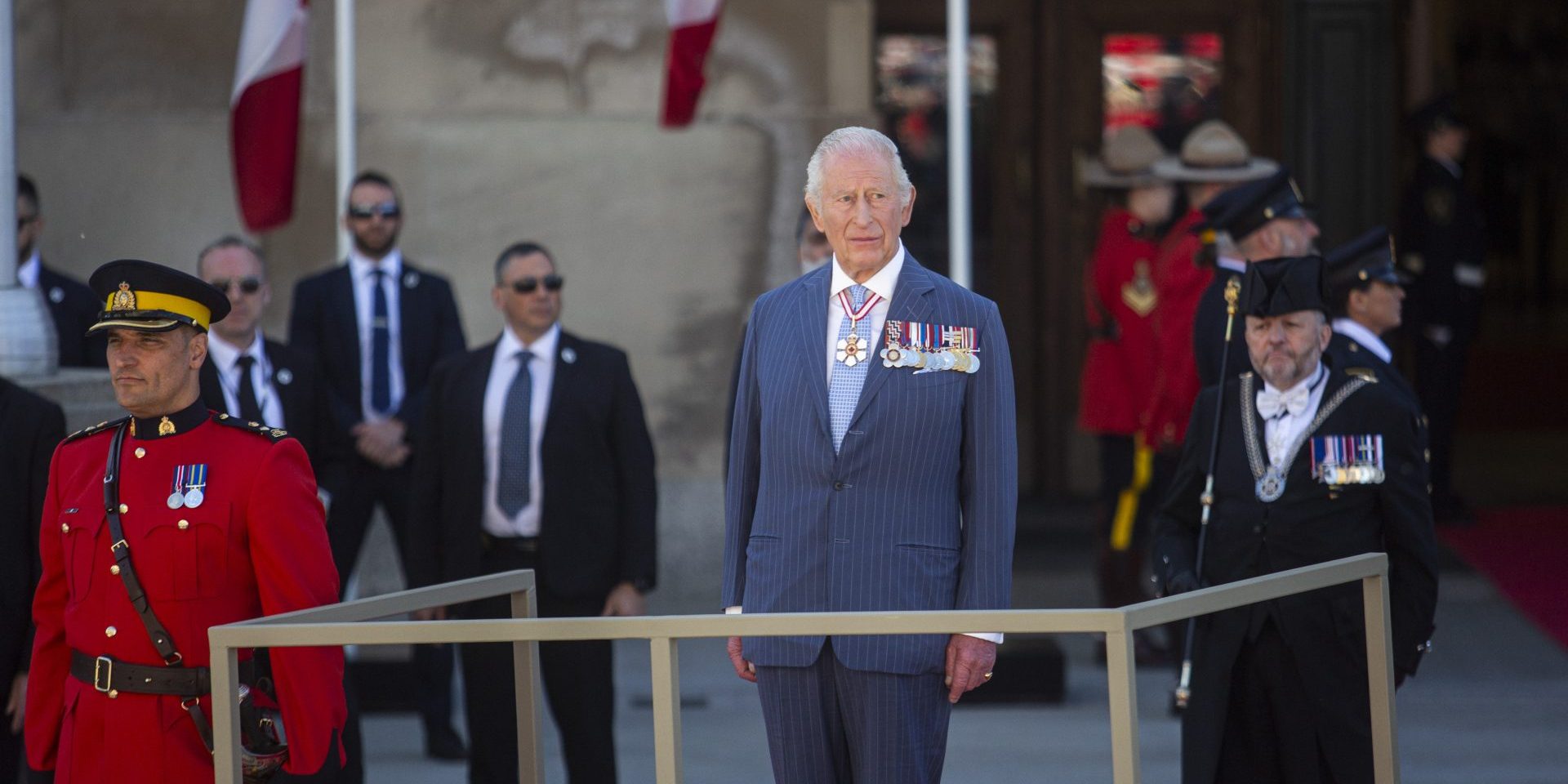
King Charles III set the tone for an ambitious Canadian government agenda, outlining plans for Canada to better protect its sovereignty, build new alliances, and develop a new economy in a historic Speech from the Throne to open the 45th session of Parliament.
“Fundamental change is always unsettling. Yet this moment is also an incredible opportunity. An opportunity for renewal. An opportunity to think big and to act bigger. An opportunity for Canada to embark on the largest transformation of its economy since the Second World War,” said King Charles, reading from a booklet, just after 11 a.m. on May 27.
A “confident Canada,” he said, can seize the moment “by recognizing that all Canadians can give themselves far more than any foreign power on any continent can ever take away.”
The King and Queen Camilla arrived at the Senate of Canada Building by an Australian-built ceremonial horse-drawn carriage, arriving at around 10 a.m. with a 28-horse RCMP escort down Wellington Street. Throngs of crowds lined the streets of downtown Ottawa, waving British and Canadian flags and cheering for the monarch. The Royals were greeted by the Honour Guard, a military band, and a 21-gun salute.
King Charles said when his late mother delivered the Throne Speech in 1957, freedom and democracy were under threat, and Canada was emerging as an economic power on the global stage, as well as a source of peace.
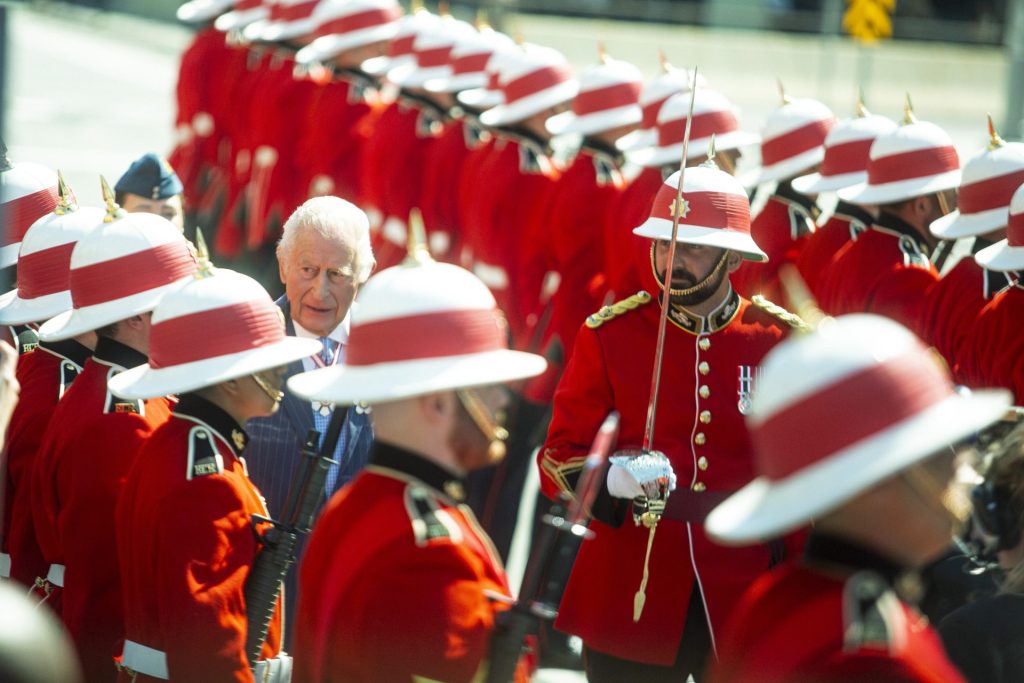
“Today, Canada faces another critical moment. Democracy, pluralism, the rule of law, self-determination, and freedom are values which Canadians hold dear, and ones which the government is determined to protect,” he said in his opening remarks.
“We must be clear-eyed: the world is a more dangerous and uncertain place than at any point since the Second World War. Canada is facing challenges that are unprecedented in our lifetimes.”
The nearly 2,500-word speech outlined the government’s plans to “protect Canada’s sovereignty” by investing in the Canadian Armed Forces, pledging to protect Canadians’ “sovereign rights, from wherever challenges may come at home or abroad.”
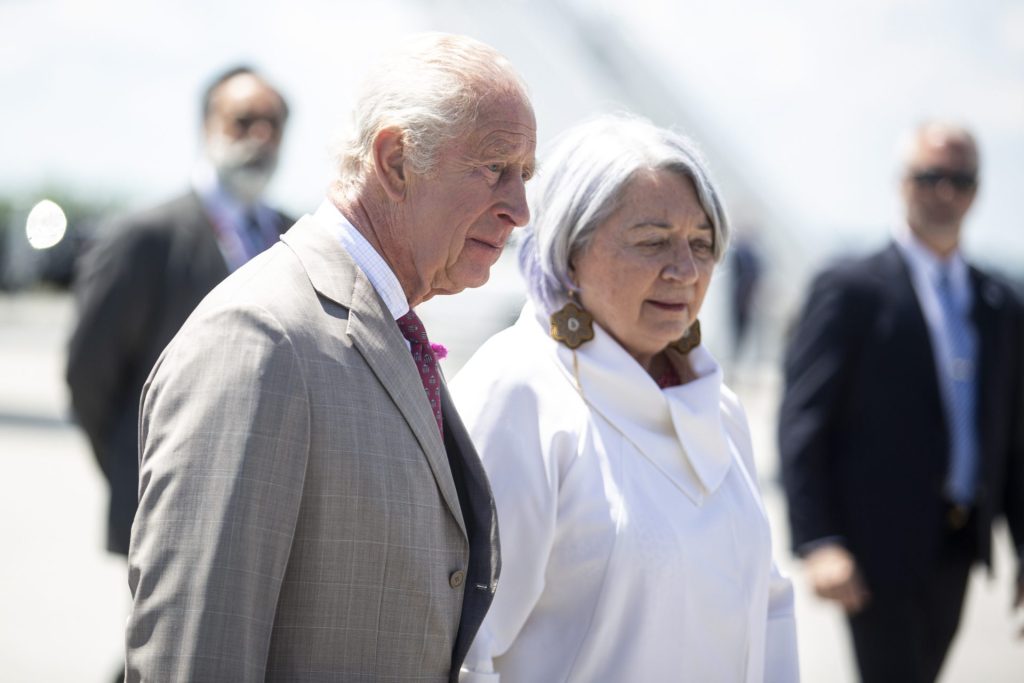
Prime Minister Mark Carney (Nepean, Ont.) confirmed he had invited King Charles to officially open Parliament’s session in his first press conference shortly after the Liberals’ April 28 federal election victory, saying “this historic honour matches the weight of our times.”
In the face of United States President Donald Trump’s repeated threats to make Canada an American state, the King’s presence underscored Canada’s sovereignty as a constitutional monarchy and part of the British Commonwealth. The speech’s first section specifically mentions “building new relationships with the United States and the world.”
Carney’s predecessor—former prime minister Justin Trudeau, who had one of the coveted seats in the room—has said Trump’s trade war and tariffs on Canadian goods are a tactic to weaken Canada’s economy to make it easier to annex. Carney, an economist and former head of the Bank of England and Bank of Canada, has been laser focused on strengthening this country’s economy and sovereignty ever since he was voted leader of the Liberal Party in March.
There have been 152 Throne Speeches since 1867, and King Charles III is only the second monarch to ever deliver one. His mother, Queen Elizabeth II, first gave a Throne Speech in 1957, and again in 1977, making May 27 the first time in nearly 50 years that a monarch has opened Parliament. It is typically read by the governor general, the Crown’s representative in Canada. No public business can be conducted by the Senate or the House of Commons until after the speech is read.
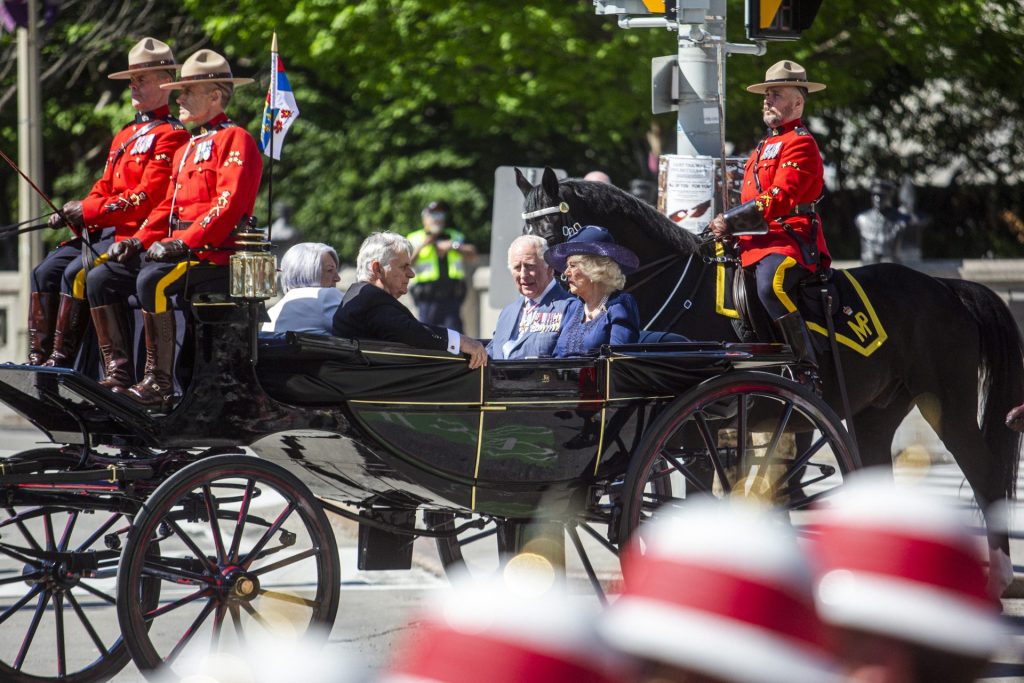
The Throne Speech, which lays out the legislative agenda, held few surprises, largely echoing what Carney emphasized on the campaign trail and during his first few weeks in government, as well as the sole mandate letter he assigned to his 28 cabinet ministers.
The speech emphasized a middle-class tax cut, affordability measures, building more homes, and building new relationships with the U.S., once Canada’s closest ally and main economic partner.
Carney and Trump have been “defining a new economic and security relationship” between the two nations, King Charles said, “rooted in mutual respect and founded on common interests, to deliver transformational benefits for both sovereign nations.”
Canada is also working to strengthen relationships with “reliable trading partners and allies around the world, recognizing that Canada has what the world needs and the values the world respects.”
The Throne Speech referenced specific legislation just twice, saying the government will develop laws to boost security at the borders in order to stop the flow of fentanyl—a reference to the rationale Trump used to invoke emergency tariff powers. The Canada Border Services Agency will be given new powers to examine goods destined for export, to prevent the transportation of illegal or stolen goods, including cars.
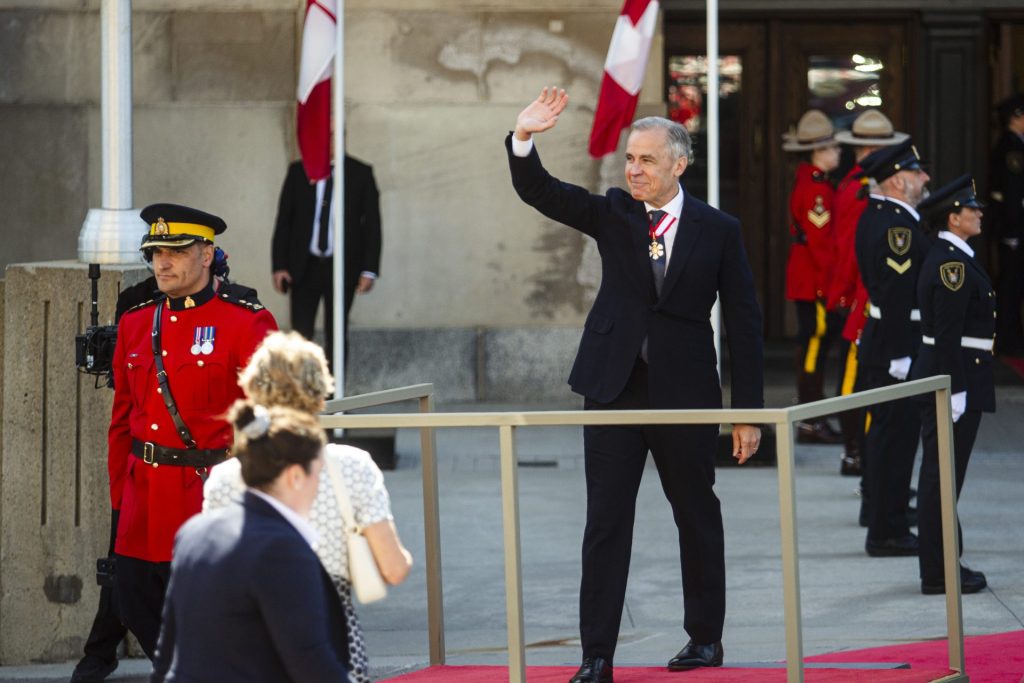
Legislation will also be introduced to remove all remaining federal barriers to internal trade by Canada Day, according to the speech that reiterated a key pledge Carney made on the campaign trail. The speech did not identify a timeline for passing said legislation, in which case, time would be of the essence as the House is only expected to sit for four weeks and the Liberal minority government will have to stickhandle support from members of the opposition.
“This is critical to unlocking Canada’s full economic potential, but it’s not enough,” the King said, adding the feds are working closely with provinces, territories, and Indigenous communities to identify projects of national significance, which will “connect Canada, deepen Canada’s ties with the world, and that will create high-paying jobs for generations.”
To that end, the Throne Speech says the government will create a new Major Federal Project Office, which will reduce the time needed to approve projects from five years to two, “all while upholding Canada’s world-leading environmental standards and its constitutional obligation to Indigenous peoples,” King Charles said.
Last week, Carney released just one public mandate letter for his entire cabinet, rather than outlining individual assignments tailored to each minister, moving away from the Trudeau government’s approach. He said this shows every member of his cabinet shares a unified mission, focused on the core priorities of the government.
The mandate letter outlines what Carney calls a “generational challenge” and series of crises Canada faces—a sentiment echoed in the Throne Speech as Canada navigates the shifting sands of its relationship with the U.S., once its most stalwart trade and defence partner. The Throne Speech mentions the economy no fewer than eight times, while the mandate letter mentions the economy five times.
“By staying true to Canadian values, Canada can build new alliances and a new economy that serves all Canadians,” King Charles said.
LIberals offer ‘the right slogans’ but no ‘real plans,’ says Poilievre
Conservative Leader Pierre Poilievre, speaking alongside Deputy Leader Melissa Lantsman (Thornhill, Ont.), praised the Throne Speech for containing “the right slogans” but said it was light on a plan.
“We’re here to turn the government’s talking points into real plans,” he said.
Poilievre said the speech emphasized getting large projects built, but made no mention of oil and gas, or pipelines, “nor did they mention getting rid of the anti-energy laws that have kept our resources in the ground.”
Poilievre, who currently has no seat in Parliament, said his party will put forward “constructive amendments” to turn the speech into “specific plans.”
He referenced Bill C-69, which became law in June 2019 and gave the government the power to consider how climate change might be affected by proposed natural resource projects; Bill C-48, also from June 2019, which restricted oil tankers in British Columbia’s north shore; and other legislation he dismissed as anti-industry, soft on crime, and contributing to the toxic drug crisis.
Poilievre said the Conservatives plan to work with the government to repeal some of these Trudeau-era laws.
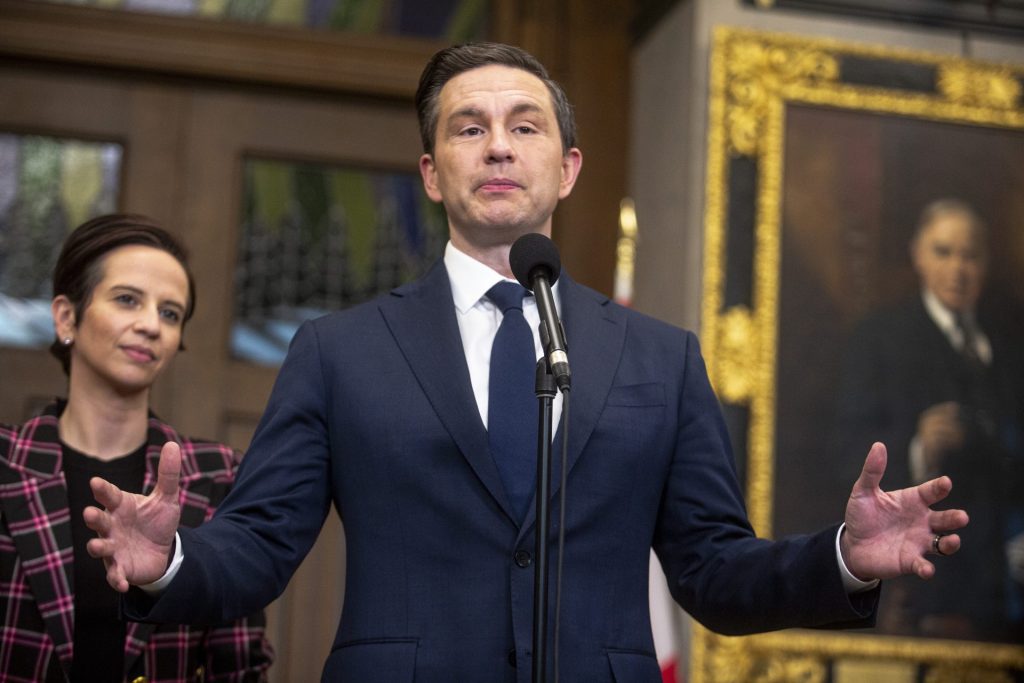
“Let’s get our pipelines building,” he said. “Let’s get our goods to markets other than the United States.”
Poilievre said the Throne Speech mentioned controlling government spending, but “there were no specific savings to roll back the morbidly obese Liberal government’s costs.
“We’re here to propose cuts to bureaucracy, consultants, foreign aid, and corporate welfare so that we can bring down taxes, debt, and inflation.”
Similarly, interim NDP leader Don Davies (Vancouver Kingsway, B.C.) described the Throne Speech as long on platitudes and short on details.
He criticized the absence of language touching on health care, Indigenous housing, or protection for workers in industries that may be impacted by tariffs and the trade war, calling the omissions “deliberate.”
“How could you have a Canadian Throne Speech that fails to even use the word health care?” he said.
But he said he was “most concerned” by the economic message in the text.
“Essentially, they’re cutting revenue to the federal government, and at the same time saying that they’re going to keep spending to under two per cent, which is the rate of inflation, or maybe under inflation,” he said. “That can only mean one thing for Canadians. It means a cut to the public services that Canadians rely on.”
He said the speech wasn’t “worker centred” and overall struck a conservative tone.
“This is a very conservative Throne Speech, and I think it’s going to be a very conservative government,” Davies said. “That’s why New Democrats are going to be, I think, such an important voice in Parliament to be pushing for progressive policies.”
mglass@hilltimes.com
The Hill Times
Editor’s note: This piece was updated at 3:22 p.m. on May 27 to include reaction from party leaders.






 LICENSING
LICENSING PODCAST
PODCAST ALERTS
ALERTS













